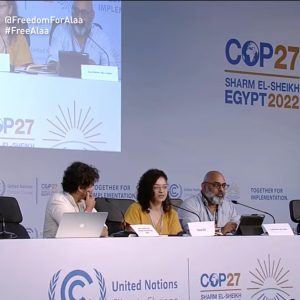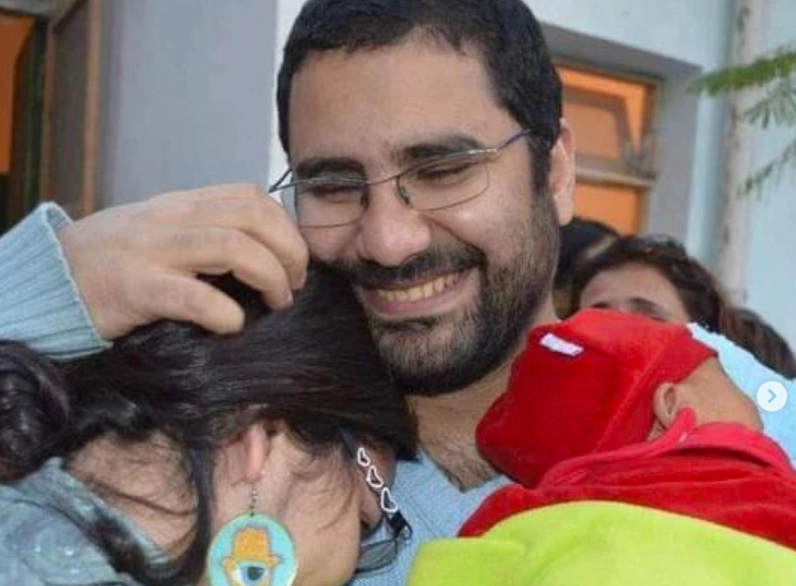18 Nov 2022 | Opinion, Ruth's blog
Freedom of expression is an amazing human right. It guarantees each and every one of us the right to speak, to write, to create. For many of us it also provides a legal framework to protect our voices, to make sure that every viewpoint, on every issue has a counter view available. At its best it drives debate and progression and makes our society stronger.
There is, however, one thing that freedom of expression doesn’t grant and that is the right to be heard and listened to. It only protects the right to speak. In some instances that isn’t necessarily a bad thing – some fringe views should stay on the fringe…
However in too many instances a lack of voices fails us all. Freedom of expression doesn’t guarantee you a seat at the table and it doesn’t ensure that a diverse range of voices influence the people making decisions that affect every part of our lives.
A case in point was this month’s COP27 conference. Only 34% of the negotiators sent by their nations to discuss the impact of climate change and efforts to get to net zero were women. This should come as no surprise. After all, most governments rarely reflect the gender balance of their countries. Of the people elected to the US Congress this month 27% are women. And 24% of the US Senate will be women. The British Cabinet only has seven women – 23% of the total. And last month’s Chinese Communist Party Congress didn’t have a single woman present.
I realise that for some this could be seen as a feminist rant. It isn’t. The lack of women just highlights how few voices get to the top table and how little room there seems to be for alternative views and perspectives. Which is why our right to freedom of expression is so important – the more voices that exist, the more arguments made, the more difficult it is for policy makers to ignore them. Which means ultimately we all win.
Our right to freedom of expression has underpinned every progressive campaign that has reshaped society since the advent of the printing press – from the end of slavery, to universal suffrage, the right to strike and the right to gay marriage, to name but a few. These views were not of the mainstream, they were not the prevailing views of the elected politicians and governments. They were however discussed, debated and then demanded by their citizens. Just as they should be – which is why we fight every day to make sure that our rights to freedom of expression are protected and cherished. Because while freedom of expression isn’t the same as the right to be heard, it’s a good start.
11 Nov 2022 | Egypt, Ruth's blog, United Kingdom, United States

Sanaa Seif, the sister of Egyptian writer and activist Alaa abd el-Fattah, speaking at COP27
It shouldn’t surprise anyone reading this that I care passionately about freedom of expression. I have dedicated my life to political engagement and campaigning and have used every right afforded to me under article 10 of the Human Rights Act as I have sought to fix problems in our society.
At Index I spend every day seeking to ensure that those people who are silenced by despotic regimes have a platform for their words and their art. I speak to journalists and stakeholders daily about threats to freedom of speech at home and abroad. After all, Index was founded to protect this most fundamental of human rights everywhere it is threatened.
But there are some weeks when even I am surprised by the scale of news coverage of freedom of speech. Especially in the UK. It increasingly feels like the phrase freedom of speech is dominating political debate as well as the comment pages in our mainstream media. Of course I welcome every mention and the truth, in an age of disinformation, trolling and political populism, is that we need a national conversation about how language, speech and debate need to be protected and cherished as our communication tools evolve and develop.
But in the last week I’m not sure that’s what we’ve seen. I want a debate about freedom of speech and expression. About how to protect and promote media, artistic and academic freedoms. Instead what we have seen is journalists arrested, in the UK, for doing their job and covering the news. We’ve seen an elected politician denounce media outlets for having the audacity to cover protests.
On the international stage we’ve seen a social media platform used by millions of people change dramatically on the whim of a billionaire within a matter of days of his taking ownership. World leaders attending COP27 in Egypt failing in all efforts to intervene in the case of Alaa Abd el-Fattah, a democracy campaigner, imprisoned because he dared to support a political protest. And in the US we’ve once again seen too many politicians undermining the very basis of their democracy as a political tool.
We deserve so much better than this.
We deserve more than political rhetoric about free speech while populists seek to hijack their own definition of free speech for political gain.
We deserve more than token diplomatic gestures when people are rotting in prison for having the audacity to demand their basic human rights.
We deserve more than our police forces arresting journalists and undermining media freedom because they seek to cover the news.
We deserve better. And Index will keep demanding better – at home and abroad.
4 Nov 2022 | Egypt, Middle East and North Africa, News and features
The 2022 United Nations Climate Change Conference, or COP27 as it is better known, opens this Sunday, 6 November, in the Egyptian Red Sea resort of Sharm El Sheikh.
As has become customary, COP27 will become the focus of protest. Yet not all protests at COP27 will be about the environment.
One protester at the event, Sanaa Seif, says that the world leaders attending will have “blood on their hands” if they do not secure the release of her brother, the British-Egyptian writer and activist Alaa Abd El-Fattah. Abd El-Fattah is a pro-democracy activist and founder, with his wife Manal Hassan, of the Arabic blog aggregator Manalaa. He has been held in the country’s prisons on and off for nine years for his part in the 25 January protests that rocked the country in 2011.
In 2013, the writer was jailed by the government of Egypt’s military ruler Abdel Fattah el-Sisi and has been in prison most of the time since where he has been both tortured and offered only limited communication with his family.
In order to bring attention to his plight, Abd El-Fattah went on a partial hunger strike on 2 April this year, limiting his intake to just 100 calories a day, sipping tea with a spoonful of honey. After six months on hunger strike, his body is seriously weakened and his health is in a precarious state. Four days ago, he stopped even that meagre daily allowance and is now taking only water.
On the opening day of COP27, he will stop even that.
Since 18 October, Sanaa and her sister Mona, have been holding a sit-in as part of their Free Alaa campaign outside the UK’s Foreign Commonwealth and Development Office to draw the attention of incoming Foreign Secretary James Cleverly to their brother’s plight.
On Wednesday this week, Cleverly finally spoke to the pair and vowed that the Government would “continue to work tirelessly for his release”.
In a Facebook post, the sisters said: “We were so relieved to finally get to speak to James Cleverly and hear his assurance that Alaa’s safe release is top priority. I hope this translates to tangible action that actually saves Alaa before it is too late.”
At a press conference on the street outside the FCDO the following day, Sanaa said: “Alaa will escalate his hunger strike as he stops taking water as world leaders head to Egypt to attend COP27. I want to tell these officials that if you don’t save him you will have blood on your hands. I want to call on Rishi Sunak – you are going to be in the same land as a British person dying and if you don’t show that you care then it will be interpreted as a green light to kill him.”
Sanaa’s sister Mona added: “Alaa is in a very critical state but he is not desperate to die. These are the actions of a man who is desperate to end this ordeal he has been sucked into for nine years and desperate to be reunited with his family.”

The British-Egyptian writer and activist Alaa Abd El-Fattah in happier times with his wife and baby son Khalid
Speaking to Index, Mona said: “In the eyes of the Egyptian regime Alaa is one of the symbols of 25 January [2011 revolution] and therefore one of those calling for an end to the leadership of the military regime. In some people’s minds he is a British national. For others he is a writer, or an activist. Most importantly, he is an amazing brother and a son. And most importantly of all what seems to be forgotten is that he is a father to a 10-year-old, Khalid.”
She added: “Khalid and his father have a unique and extraordinary relationship. Khalid is on the autistic spectrum and is non-verbal. We found out his diagnosis back in 2014 when Alaa was serving his first five sentences. Alaa was briefly released in 2019, although he had to spend every night in a police cell, and Alaa and Khalid formed an amazingly strong bond. We were worried about how Khalid would receive his father because he was not used to him in his life. We were honestly surprised. He and Khalid bonded immediately. He flourished under Alaa’s presence and Khalid’s doctors and teachers all noted a massive difference.”
“When Alaa was taken again in September 2019, the one hit the hardest was Khalid. When Alaa appeared before the state security prosecution, Khalid was angry with his father for disappearing. Since then, it has been particularly difficult to sustain Alaa’s presence in Khalid’s life. A very big part of why Alaa has taken such extreme measures is that he feels Khalid has been orphaned.”
Mona and family will hold a candlelit vigil for Alaa outside Number 10 Downing Street at 4pm on 6 November. Meanwhile, Sanaa will fly out to Egypt to take part in an event with the German climate envoy, Human Rights Watch and Amnesty International at COP27 next Tuesday.
“This will serve as an embarrassing reminder to everyone,” Sanaa said.
Mona has another message to the leaders attending COP27. In another Facebook post this week, she wrote the following.
“Regardless of how it ends Alaa has already won this battle. If he makes it out alive and joins us, his family, in safety. Then he would have done it using only his body and words. If he doesn’t make it and dies in prison, his body will tell the whole world what a bunch of liars you all are, ruthless inhumane creatures that should not be trusted with one plant let alone people and the future of this planet.


